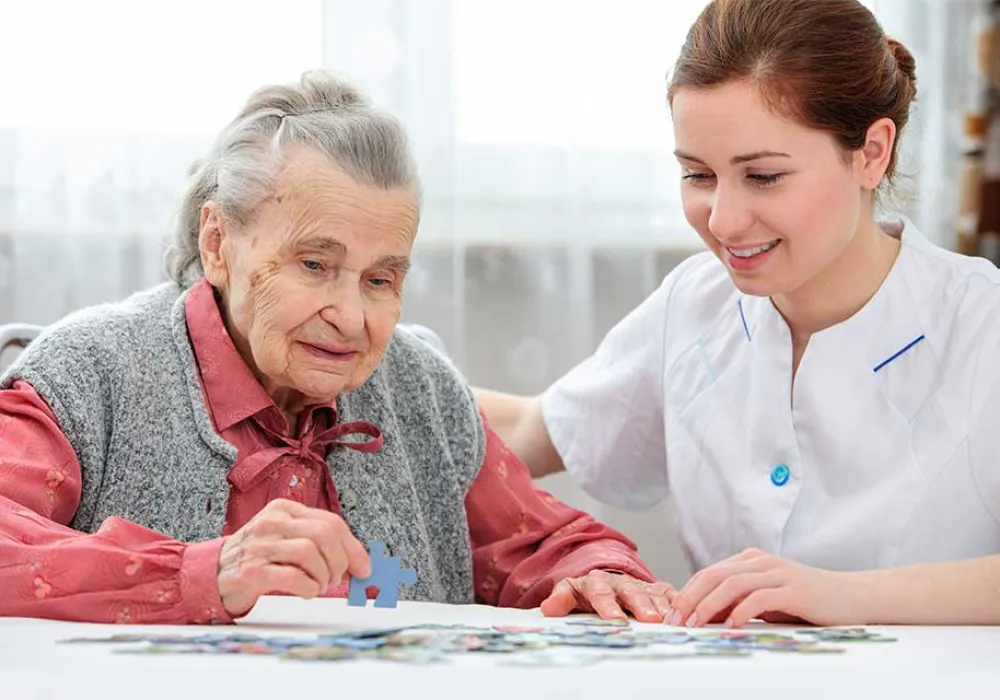The Importance of Socialization in Memory Care Facilities and Strategies to Promote Connections

Memory care facilities are designed to provide a safe and supportive environment for older adults with memory-related conditions. These conditions can include Alzheimer's disease, dementia, and other cognitive impairments that impact an individual's ability to perform daily activities. Memory care facilities offer round-the-clock care, medical attention, and assistance with daily activities, such as bathing, dressing, and eating. However, it is equally important to address the emotional and social needs of older adults. Socialization is a critical aspect of memory care facilities that can greatly impact the mental and emotional well-being of older adults. In this article, we will explore the importance of socialization in memory care facilities and its benefits for older adults.
Importance of Socialization in Memory Care Facilities
Socialization plays a significant role in improving the quality of life of older adults. It offers an opportunity for them to connect with others, form friendships, and participate in group activities. In memory care facilities, socialization is particularly crucial as it helps to create a sense of community, reduce loneliness, and combat feelings of isolation. Older adults who feel connected to others tend to have a better overall quality of life and a more positive outlook.

Reduced Risk of Cognitive Decline
One of the most significant benefits of socialization for older adults in memory care facilities is a reduced risk of cognitive decline. Engaging in group activities and socializing with others can help improve cognitive function and reduce the risk of cognitive decline, particularly for those with dementia or other memory-related conditions. Research has shown that socialization and engaging in group activities can have a positive impact on memory, attention, and problem-solving skills. Participating in social activities can also provide mental stimulation, which is essential for maintaining cognitive function. For older adults with memory-related conditions such as dementia, socialization can be an effective way to slow down the progression of the disease.
Increased Happiness and Quality of Life
Socialization can lead to increased happiness and overall quality of life for older adults. When older adults engage in social activities, they experience a sense of purpose and belonging. They feel valued and appreciated by others, which can boost their self-esteem and confidence. Participating in group activities also offers a sense of fun and enjoyment, which can enhance their mood and overall well-being. Studies have shown that older adults who engage in social activities have higher levels of life satisfaction and overall happiness.
Improved Physical Health
On top of increased happiness and mental well-being, socialization is known to have a positive impact on physical health, including reduced risk of depression, better immune function, and improved cardiovascular health. Studies have shown that older adults who engage in social activities have lower rates of depression and anxiety. Socialization also boosts the immune system, which helps fight off illnesses and infections. Additionally, participating in physical activities such as dancing, walking, or yoga during socialization can improve cardiovascular health and decrease the risk of heart disease. Engaging in group activities can also help older adults maintain their physical mobility and reduce the risk of falls or other injuries.

Reduced Stress and Anxiety
Socialization can reduce stress and anxiety, particularly for those who may feel isolated or lonely. When older adults feel connected to others, they are less likely to experience negative emotions such as stress and anxiety. Participating in group activities provides a sense of community and support, which can alleviate feelings of loneliness and isolation. For older adults with memory-related conditions, socialization can also reduce agitation and improve overall mood. Socialization can also help older adults cope with the stress of living in a memory care facility. It provides an opportunity to take their minds off their health conditions and focus on social interaction.
Creating a Welcoming and Inclusive Environment
To promote socialization in memory care facilities, it is important to create a welcoming and inclusive environment. Memory care facilities should offer a variety of group activities and events that cater to the interests and abilities of all residents. Activities such as music therapy, arts and crafts, cooking, gardening, and exercise classes can encourage socialization and provide opportunities for older adults to connect with others. Group activities can also create a sense of camaraderie and support, as residents share their experiences and offer emotional support to one another.
It is important to offer activities that cater to the physical and cognitive abilities of all residents, as socialization should be accessible and inclusive for all. For example, some residents may have physical limitations that make it difficult to participate in more active activities. In this case, activities that are more stationary or involve minimal movements, such as board games or card games, can be just as effective in promoting socialization. Staff should also make an effort to involve residents in activities they enjoy and to encourage participation in group events.

Encourage Informal Socialization
In addition to organized group activities, it is important to encourage informal socialization among residents. For example, memory care facilities can create communal spaces, such as sitting areas or outdoor gardens, where residents can gather and socialize. Staff can also encourage residents to interact with one another during meals or other daily activities. By promoting socialization in both formal and informal settings, memory care facilities can create a sense of community and belonging for residents.
In conclusion, socialization is a critical aspect of memory care facilities that can significantly impact the mental and emotional well-being of older adults. Engaging in group activities and socializing with others can have a positive impact on cognitive function, happiness, physical health, and stress levels. It is essential to create a welcoming and inclusive environment in memory care facilities that encourages socialization for older adults. By prioritizing socialization, memory care facilities can help improve the overall quality of life for older adults.
In addition to the benefits discussed above, socialization can also have a positive impact on the families and caregivers of older adults in memory care facilities. When older adults are engaged in social activities and forming connections with others, families, and caregivers can have peace of mind knowing that their loved ones are receiving emotional support and are living fulfilling lives. Socialization can also provide a sense of relief for families and caregivers who may feel overwhelmed or isolated in their caregiving role. By promoting socialization, memory care facilities can offer support not only to their residents but also to their families and caregivers.
In conclusion, socialization is a critical aspect of memory care facilities that can significantly impact the mental and emotional well-being of older adults. It is essential to create a welcoming and inclusive environment that encourages socialization and offers opportunities for residents to connect with others. By prioritizing socialization, memory care facilities can help improve the overall quality of life for older adults, as well as provide support and relief for families and caregivers.
Share Post:
Comments
Virginia Hamlin 7 months ago
Hi,Just wanted to say that I love your content. Keep up the good work.
My friend Jordan from Thailand Nomads recommended your website to me.
Cheers,
Virginia Hamlin